Chapeau. MT @Pray4Pal: Despite not receiving his salary for months, this cop continues to help. #Gaza #Palestine: image via Asem Khalil @Asem Khalil, 19 February 2015
Balancing on the pivot point, small arms held out like frail stabilizing wings
no handrail over the permanent beckoning abyss of imminent disaster
in the flooded back alley of the land of the forgotten this lost Troyclogged drains and swamped pavements an arabesque of ripples maybe sewage
and fanning out from there in thought from afar as an implausible possibility miraculous
waves that will someday reach or not reach a shore that extends beyond
this cruel kind of child's play

Gaza City. A Palestinian girl walks on a makeshift iron bridge in Shati refugee camp during a rain storm: photo by Majdi Fathi/NurPhoto/Corbis via The Guardian, 19 February 2015

Lena River Delta: Landsat 7 satellite image by USGS EROS Data Center Satellite
Systems Branch, 27 February 2000 (NASA)
Two brothers from #Gaza are carrying their younger brothers to protect them from the intensity of the rain: image via Huda Kishawi @Huda Kishawi, 19 February 2015
In the poem “A Soldier Dreams of White Lilies,” which you wrote in 1967, the soldier is asked if he will die for the sake of the homeland. And he answers: “No, No. . . . They taught me to love her love/but I never felt her heart to be my heart. . . . My instrument of love is a rifle." The same soldier wants to live in peace for the sake of his small son, and as far as he is concerned the homeland is nothing more than “drinking my mother’s coffee” -- in contrast to the Arab, who “smells its grass, its branches, and its roots.” Aren’t you minimizing the connection between the Israelis and this land?
I understand what’s hidden behind the question. I’m not evading the answer, but I want to remind you that I was severely criticized for this poem by Arab artists, because it goes against their stereotypical view of Israelis. The subject here is a soldier I knew. We sat together one night and he told me the story of his life. He hated the State and the Ministry of Defense -- something unacceptable at the time in the wake of the 1967 war. The poem was a response to a stereotype. In the Israeli soldier, who was supposed to be a tank, I saw flesh and blood. That was seen [by the Arabs] as a great betrayal. The story is true. This soldier left the country after the war.
There is a feeling in Israeli society of rootlessness. It’s a new society. Not all Israelis were born in Israel. In 1967, the State was only twenty years old. It is impossible to create a society with roots and cultural references in one or two generations. That’s why learning love for the land had to come through Israeli education. There were no Jewish farmers in Russia. That’s a new patriotic profession that was created in Israel. That’s why the kibbutz came into being. I’m not criticizing here. There was no real physical connection between the Jewish psyche and the earth in Eretz Israel. The Zionist movement worked hard to convince Jews to cling to the soil, and is still trying. So what are you claiming? I am claiming that this was the first Arabic poem to give the Israeli voice a platform.
And what does this voice say? That for him this homeland is “drinking his mother’s coffee".
This voice says that he is human, that he is a human being, not a rifle. That his relationship to the homeland is a search for security, drinking coffee in the morning in silence. Today, that is my Palestinian dream.
That sounds new to me.
Right. Where do I minimize the relationship of the Jew to the land? That is not the central point of the poem, which is rather that the soldier was a human being. You can’t stand in my place and see the image of that soldier as pictured in the mind of my reader. I’m not trying to draw a prettier picture, but I was very touched by this young man, who went through the horrors of war and hoped to hear the cooing of doves from the roof of the Ministry of Defense. I don’t want to lie to you and say that it disturbs me when someone speaks against the state. I welcome it. I didn’t have any love for the State of Israel. And I still don’t. And I think that you all need to listen to me well: You can’t ask a Palestinian to love the State of Israel.

Israeli Extremists Attack A Palestinian Shepherd Near Hebron via @imemcnews #Palestine: image via al whit @soitiz, 19 February 2015
For the Palestinian this is not Eretz Israel. This is Palestine. A foreign body is a foreign body. Today it’s rare to find a Palestinian who speaks the truth. We are in a process for peace, everyone has to change his account of his history, but don’t get upset when every Palestinian is convinced that Palestine belongs to him. Now he accepts that he has a partner. That is tremendous progress. Don’t take this lightly. And don’t be alarmed if you find out that he thinks that Palestine is his. For what country is his? He was born there. He doesn’t know any another country. You are the foreigners in his eyes. How many years ago did you arrive? You -- at one time you were there, and he can’t count how many years he has already been there. And it’s not even certain whether or not you were those [people]. Are you the descendants of King Solomon? True peace is a dialogue between two accounts. You claim that this land has always been yours, as if history didn’t continue while you weren’t there, as if there was no one there, and as if the land had only one function -- to wait for you. Don’t force your account on me and I won’t force mine on you. We must recognize that everyone has the right to tell his own story. And history will laugh at both of us. It doesn’t have time for Jews and Arabs. Many peoples have passed through. It’s good that [history] is cynical.
This soldier says: “My instrument of love is the rifle.”
That’s the soldier’s profession. Without the rifle the Israeli state wouldn’t exist today. If one values true confessions -- this should be said. But coming from an Arab it doesn’t sound good.
And what are your instruments of love? There’s also great violence in your love: “And this land is a guillotine whose blade I love.” Hasn’t hate harmed you?
No. My instrument of love is poetry. When I see the shadow of hate in my poem, I change it. One must never write from a feeling of hate. It is against literature. The verse you quoted is the pinnacle of love: Even if this land is a guillotine, I love it.
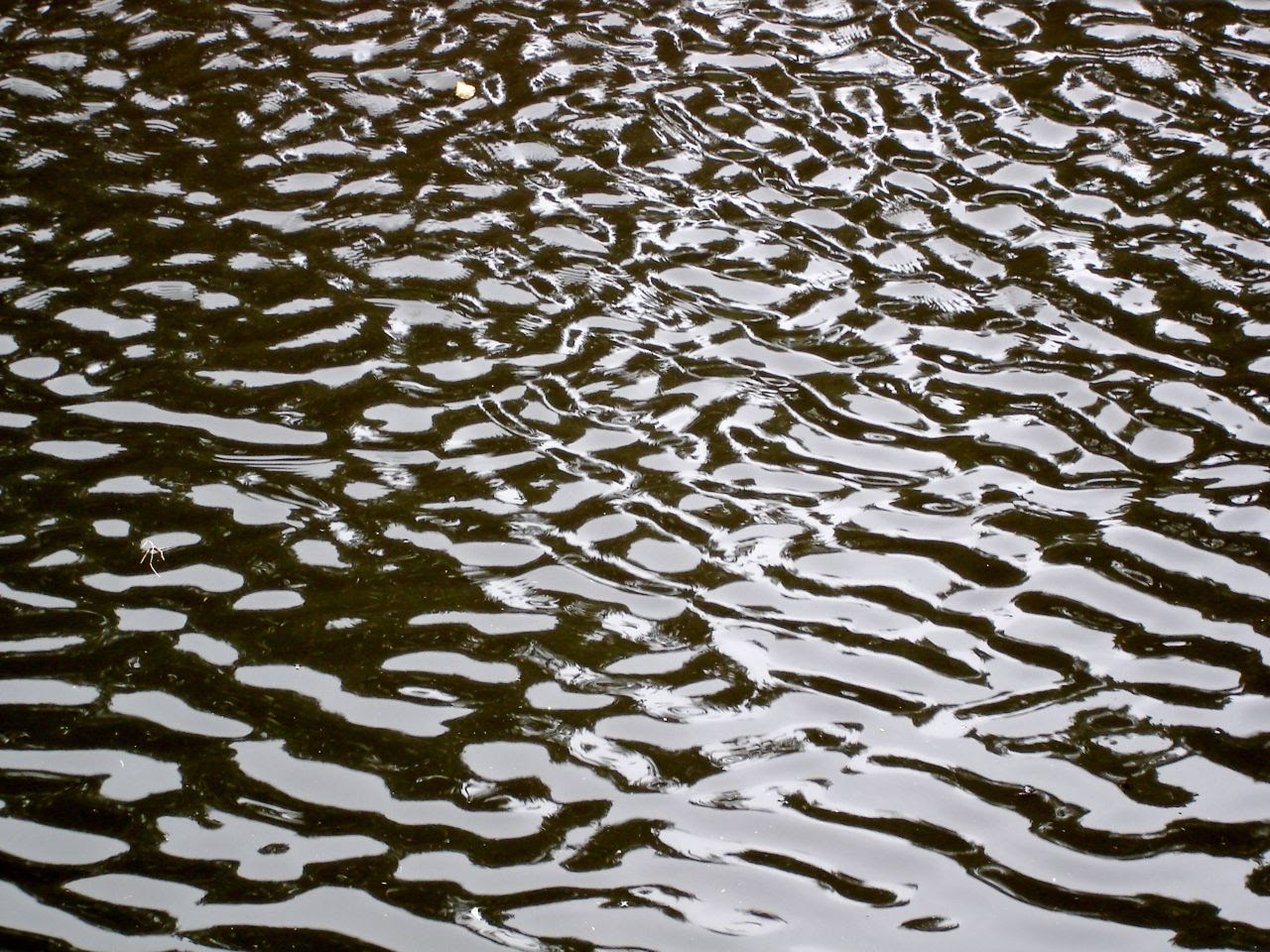
Water ripples: photo by Ron Pieket, 26 January 2009
In a specific period, yes. I could understand it. Because history doesn’t act in an elegant and just way. The balance between power and justice always leans toward the side of power. And power creates justice. That’s history. When we are witnesses to a historical turning point, we suffer. When we are the inheritors of a historical situation, we justify. That’s the difference. The Arab presence in Spain wasn’t legal according to the standards of justice, but history worked out that way. Now I’m witness to a dialogue between presence and absence. And as a living witness who has just emerged from the previous historical situation, I cannot accept the inequality that I see. If I were only a reader of history, I would accept it. Our tragedy is that we are all witnesses to a historical turning point, a new order in history and geography. That’s why everyone is making his own claims. We have arrived at a new chapter, which is called the peace process. Unfortunately, it’s more about the process than about the content. It is a pragmatic, sometimes despicable, American expression. It’s vulgar. This process leads to a shared and divided reading of the shared and controversial history of this place. And we have one place. Regrettably. Or happily. I don’t know how to write poems about this period. The whole conflict arose over the same place. You love this place, and express your love for the same plants, the same grass, as if you were me. As if you were speaking in my name. And that is the power of literature. Hebrew and Arabic poetry intersect in the writing about the landscape. A number of Israeli poets express my relationship to the landscape in poems that I could have signed myself. I won’t mention names. Wars between poets are harsher than wars between dancers. I’m not engaging in rivalry when I write about the same place or the same plant. But it is our fate to dwell in and inhabit the same metaphor. And that is new.
Set aside the metaphor.
Very well. Also in reality. With the same nostalgia. When speaking about returning to the land, you don’t know who’s a Jew and who’s an Arab. You rose up, were victorious through the power of the rifle, and -- you won’t believe me when I say it -- through the power of morality. Through the power of the rifle, you succeeded. Through the power of the stone, the Palestinians also succeeded -- in being present, nothing more than that. So if we understand one another in this way, a background will be set for true debate. The time has come. But don’t set preconditions. I won’t speak with you if you think that Palestine is yours! Palestine is mine. And I will think that forever. What right did you have to think the Land of Israel was yours for two thousand years? And how many cultures, how many empires were there! You never stopped dreaming. OK, dream. But your dream was farther away in time and place than the distance between myself and the dream and the place. I have been an exile for only fifty years. My dream is vivid, fresh.
Archaeological excavation in Troy: photographer unknown, 1937
I know how much power the dream has. But it’s also possible to dream differently in the future. To dream that this land will become a paradise. This land is called the land of peace; there was never any peace in it. But don’t ask us to justify our presence there. We weren’t conquerors. There’s a certain tendency now to push the Palestinians to think that they’ve erred in their account of their connection to the land.
Where do you get that?
It expresses itself in the perception of the Zionist movement as a national liberation movement. That wasn’t so. It was a complex and nonreligious settlement movement, which was connected to commercial interests of the West. You think that the Arab liberation movement was neo-fascist. One must establish a dialogue between the two accounts. This peace doesn’t require me to change my reading of the history of Zionism and my position toward it. I need to change my perception of the future, but the battle over the past exists. Only the language has been refined.
Even if I think that your grandfather was a conqueror, that doesn’t prevent me from recognizing your right to exist. Every one of us has a conquering grandfather. Show me one innocent grandfather in all history. So why do we need to acknowledge that Zionism is a liberation movement? Liberation from whom? At whose expense?
A not insignificant number of Israelis speak about the tragedy of one justice opposing another.
I don’t accept that the two sides are both just. Justice doesn’t battle justice. There is one justice. I prefer entity versus entity. Account versus account. Claim versus claim. Absence versus presence, or vice versa. But not justice versus justice. That’s the biggest sham I’ve ever heard, like the other one, “that the Land of Israel is a land without people for a people without a land.” Two lies. Why are we renewing this conflict? In order to liberate Israeli consciousness from the illusion that the Palestinians lost their collective memory. For the Palestinian there is no other land. And for the Israelis there have been many lands. You are a mixture of how many people? From how many places of origin have you come? At least fifty. Yet historical development created two entities in one land and it’s good that we’ve arrived at a dialogue. Permit the historian to speak. Otherwise you’ll suffocate the right to speech. That is the cultural aspect of the matter. And it will recover from a number of diseases, illusions, and lies.
Zionist colonists destroy hundreds of olive saplings #Palestine: image via Voice from Palestine Asem Khalil @Palaestina, 19 February 2015
I have also listened to Israelis who see Palestinians as their brothers in this land. Are you able to feel that way toward Jews?Not yet. Because I was cut off from the land for twenty-six years. Helit, the conqueror is always more forgiving. He has the luxury of being moderate. If I had been victorious, I would have been able to say that. But in the meantime, don’t believe me if I say it. There are conditions for love. The lover must be accepted, and not hungry. It’s true that there is no absolute equality in love, but the lover must at least feel desired. Until now the Palestinians haven’t felt accepted. What you said sounds beautiful to my ears. The Palestinian must tell you that you are his sister, and one must work to actualize that understanding. But let him complain.
The history of relations between intellectuals and power has always been characterized by a healthy antagonism. Don’t you think that there are historical moments when their courage should be expressed precisely in support and encouragement, as when some among us supported Rabin and Peres?
Our task is to criticize the process. I wasn’t opposed to the Oslo accords. I expressed doubts about them. I’m not opposed to peace. I wanted the land to be divided between two peoples, not to have one part here and another part there, closed off in ghettos. Only culture is a guarantee of true peace. I encouraged the leadership in its time of weakness. Now that they are strong, I’m allowed not to applaud. If a Palestinian state is established, I will be in the opposition. That’s my natural place.
In an interview the two of you held, the French philosopher Gilles Deleuze posed the question: “Why did the Israelis choose Hebrew and not another living language?” You answered: “This choice was a part of the creation of the great legend that the ‘right to return’ to the land of the Torah requires its own linguistic tools: the language of the Torah.”
I know that the Israelis chose the Hebrew language. For five hours already we’ve been on good terms, and it seems to me that there’d have been no point to the interview if we weren’t going to argue. The choice of Hebrew was meant to actualize the Israeli national identity. It is impossible to create the consciousness of a true identity without a common language. Hebrew existed only in the synagogue, in texts, perhaps in the heart. That is beautiful. But it was not the language of communication between people, just like a few crazy people still write in Latin. Maybe there is someone still writing in Assyrian? Hebrew was an almost secret form of writing. Without relation to society. There were writers, but there weren’t any readers.
Hebrew never ceased to exist, and in any case it wasn’t a question of choice. It was also the language of longing.
I’m not an expert in this matter.
You’re not an expert in longing?
The language of longing was sometimes Yiddish, no? But the State of Israel chose Hebrew and fought against Yiddish. Deleuze’s question was about Jewish genius. He thought that the Jews were geniuses who had contributed a great deal to human culture. Why did a portion of them agree to cut themselves off from world culture and go into the ghetto of Hebrew? That is a philosophical question that shouldn’t be taken lightly. As a philosopher, as a student of Nietzsche, [Deleuze] has the right to ask how a culture can be created through the choice of language, out of an ideological impulse, and succeed. The question is simply a question.
As to the expression “the legend of the right to return,” which bothered you -- it’s good that we’ve passed beyond the era of legends. What was a legend has become true. I am busy with my own right to return. I can’t defend the Israelis’ right to return.
This is how people who lost their houses in the war spend the cold rainy weather #Gaza photo by @Mahmoud_Gaza1: image via Guess What @Farah_Gazan, 19 February 2015
Your
poem “Other Barbarians Will Come” ends like this: “Can a new Homer be
born after us . . . and myths open their doors to everyone?” How do you see the Homeric poet in our era? Is there a place for epic poetry today?There is no place for the Homeric poet, but there is a place for the poet of Troy. We haven’t heard his poem. We haven’t heard Troy’s account. I’m sure there were poets there. The voice of Homer, the victor, vanquished even the Trojan’s right to complain. I try to be the poet of Troy. Is it painful? I love the vanquished.
Be careful, you’re beginning to sound Jewish.
If only. Today it’s very accepted. There are always two faces to the truth. We’ve heard the Greek account. We’ve even heard the voice of the Trojan victim from the mouth of Euripides, the Greek. I am searching for the poet from Troy. Troy hasn’t told its story. Does the state that has great poets have the right to vanquish a people that has no poets? Is the absence of poetry in a people reason enough for it to be vanquished? Is poetry allusive, or is it one of the instruments of power? Can a people be strong without poetry? I am the son of a people that until today hasn’t been recognized; I wanted to speak in the name of the one who is absent, who is the poet of Troy. There is more inspiration and human wealth in defeat than in victory. There is great poetry in destruction. If I belonged to the victors, I would turn out for demonstrations of solidarity with the victim.
Are you sure?
I
wrote it. “Let Arafat besiege Tel Aviv, and I would turn out to
demonstrate against him.” Do you know what a pleasure it is to be both
victorious and humane? To be in solidarity with the defeated? . . . Do
you know why we, the Palestinians, are famous? Because you are
our enemy. Interest in the Palestine problem comes by way of interest
in the Jewish problem. . . If our war had been with Pakistan, no one
would have heard of me. So we are unlucky that our enemy is Israel,
which has so many sympathizers in the world, and we are lucky that
Israel is our enemy, because Jews are the center of the world. You have
given us defeat, weakness, and publicity.
"@LeJebly: Found a Mahmoud Darwish quote way at the top of the Sacré Coeur cathedral in #Casablanca" #Palestine #Darwish: image via Ahenjar @ahenjar, 8 September 2014
When you say that you would like to be the poet of Troy, isn’t there some desire for defeat in that?
No.
I find what is vital there. There I can speak the un-spoken, say the
things that haven’t been said. Poetry is always a search for things that
have yet to be said. I can’t add anything to Homer, but the human void
within me, which is Troy, I can build on that. Defeat is a key to
observing human fate, an observation impossible for the victor. Despair
brings the poet closer to God, returns him to the genesis of writing, to
the first word. It counteracts the victor’s power of destruction,
because the language of despair is stronger than the language of hope.
Troy’s words have still not been spoken, and poetry is the beginning of
speech.
Do you know the Book of Lamentations? That is also a poem of Troy.
True. But you must choose: to be Sparta, Athens, or Troy. You can’t have it all.
In Eleven Stars you write: “Soon we will investigate the affinity between our history and your history in distant lands.” Has the moment of investigation arrived? How does it illuminate this affinity?
The
time for investigation has arrived. We are now turning to one future.
We are now speaking in the language of a new world, economic prosperity,
mutual forgiveness. I think that the future is clearer than the past.
We will fight over the past. I am linking this to what I said about the
right of every side to its own account. When one goes to the
international party of dreams, all of the opposing sides speak one
language. I could write the speech of every side. But the struggle is
over the point of departure. We are the two stupidest peoples in
history. We are so small, unaccepted, Josephs hated by their brothers.
The ideology of states and identity cards is what created the conflict.
We are peoples who were born to be the subject of poems. When we came to
the political game we began to fight. When we make peace, we will laugh
about this entire phase. But there is a question that worries me: Are
we ourselves? Are we free enough to make independent wars and an
independent peace, or are we pawns in a game of chess? Once we wanted to
be Jews. Now you want to be Palestinians. What is it with you and the
Palestinians? You have obtained the whole universe, why suddenly do you
want to be Palestinians?
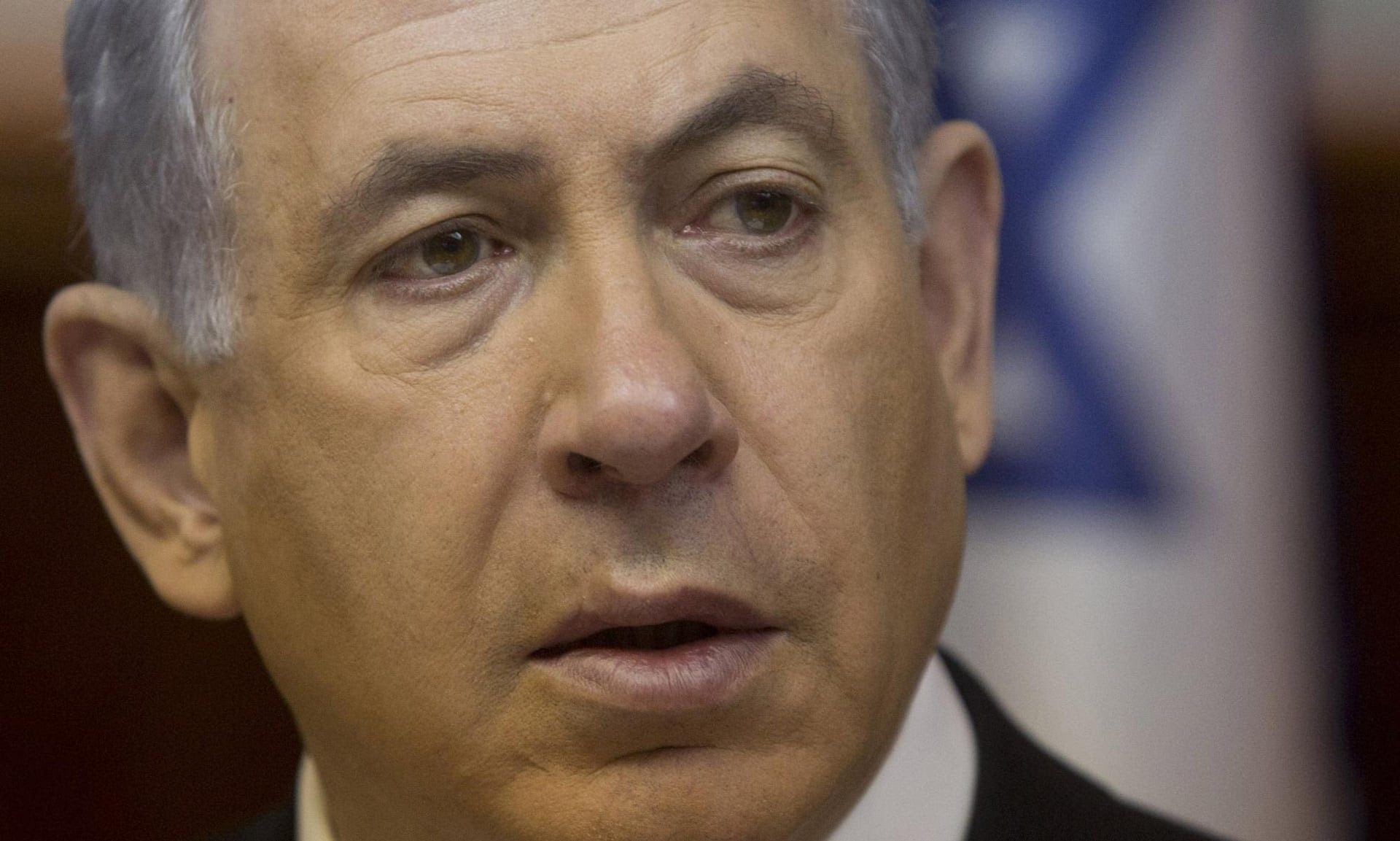
Binyamin Netanyahu: being used as a ‘political tool’ according to some House Democrats: photo by Sebastian Scheiner/AP via the Guadian, 19 February 2015
What do you mean by “Are we ourselves?”
Poetry must always ask the question without answering it. This poem is about people returning and not finding themselves. Is the I-that-was the I-that-returned? Even Ulysses didn’t return as the same man. The sea changed him. The sea and the years. He didn’t find the same house. He didn’t find the same Penelope. You don’t find yourself twice. Every day you are a different man.
Who told you that we want to be Palestinians?
You
came to Palestine. Culturally, you were global. Is the flag more
important than Homer? Let history answer the question. And we wanted to
be Jews. Our whole region hates us. So we play games that might
entertain the historians, but I am sure that in ten years we’ll become
bored. We will have obtained the whole legend, all of reality, all the
wars, and all the peace. What will we work for? Will it be possible to
turn this hole into a place of musical creation? I doubt it. We will be
normal. And to be normal, everyone must pass through legends, myths.
Afterward I think we will all be assimilated into the region.
... In Eleven Stars you write: “I am one of the knights of the end/I will jump off/my horse in the last/winter, I am the Arab’s last gasp.” Does the poet have no other mission than being a “knight of the end”?
That
saying comes from Abu ‘Abdallah al-Saghīr, the last Arab king of
Granada, who, upon arriving at the mountain, looked behind him and wept.
The Spanish engraved it on a stone: Here was the Arab’s last sigh. His
whole story is tragic. His mother pushed him into a war whose outcome
was clear. He had a choice: to accept peace, which was nothing other
than surrender, or to suffer defeat. I identify with this. I am not “the
Arab’s last sigh,” but when I write it, I live within it. As if I’m not
of the twentieth century.
There
is a very important level to your question, and that is the matter of
the past in poetry. I think that poetry is a reactionary form of
writing. It always listens to voices from the past, to voices that are
no longer. There is no modernism that comes from the present. The past
is the most inflexible time. You need to be on the oldest street in
Paris for the tone of the poem to be modern. Poetry that is cut off from
the ancient past is an echo that cannot return. In every poem it’s
possible to read the history of poetry. A poet is the first man. Every
poem must say that man is currently arriving, currently being expelled,
and returning to his true paradise. The balance between the past and the
future in poetry is that, however far in the past it may be, that is
how close it is to the future. No poetry comes from an “American way of
life.” [in English in the original] The more you delve into the Canaanite, the Sumerian history, the more
rooted you will be. No piece of earth ever completely dries up. Even
when you listen to a song on the radio, if it doesn’t remind you of a
distant place, it doesn’t touch you.
A boy riding his bicycle in Al-Shijaia area east of #Gaza city during bad weather! #GazaunderRubble: image via Asmaa @Asmaa Abdalla, 19 February 2015
And the poet is the knight of the end?
As a poet I felt as though I was the last knight on the page of history. I identified myself with the man who was the Hamlet of Andalusia. He doesn’t know [what to do]: To fight or not to fight? So his mother recited the famous poem: “You cry like a woman over a kingdom that you did not defend.” She knew that he would lose, and pushed him to fight. That is exactly what is happening now. Truth doesn’t have only one face. No historian can judge him. His fear, hesitation, and defeat are understandable. There were those who said to him: Kill yourself. Be valiant. So between being valiant and being pragmatic, this man became the Arab Hamlet. And every generation curses him. Granada was finished. All of Arabic culture ended there. So how does a man respond to such a trial? He saves himself. They allowed him to flee. They promised him a small kingdom, but they betrayed him.
“Who am I after the night of the stranger?” Who are you?
Ooh la la! That question remains unanswered in the poem. I am not myself. If there is no stranger in my identity, I don’t recognize myself. I can be defined only through the dialectical relationship between myself and the other. If I were alone, without my fellow man, what would I understand? I would be filled with myself, my entire truth, without dualism.
Ever since I left Andalusia I have been searching for the answer, ever since I left the history of the other, of my fellow man. Ever since and up until today I have been searching for a place in history and am far from finding it. I am outside the history of my fellow man and outside the history of myself.

Rivers of southern India: photo by NASA, 2005
You speak about the other, when for the most part the other is the Palestinian. Is there a place within yourself today for the other who is the Jew, the Israeli?
It is impossible for me to evade the place that the Israeli has occupied in my identity. He exists, whatever I may think of him. He is a physical and psychological fact. The Israelis changed the Palestinians and vice versa. The Israelis are not the same people that came, and the Palestinians are not the same people that once were. In the one, there is the other. If the Israeli left my identity, would it crumble? That, I suppose, was your question. I don’t want to get into these types of questions. After all, I am a son of Arab culture. If I were absent from this historical moment, I would find myself in Morocco or Yemen. So you should know that neither the Israeli of yesterday nor the new Israeli has the power to remove me. Because I have a massive identity card and it stretches from the Atlantic Ocean to Yemen. I have somewhere to flee, somewhere to die, and somewhere to be born anew. At this moment we are speaking about the Israeli component of Palestinian identity. It is a multivalent, heterogeneous element. I need heterogeneity. It enriches me.
The other [aḥer] is a responsibility [aḥarayut] and a test. Together we are doing something new in history. Fate asked us…
Forced us. . .
Initially
it forced us, now it asks -- it is so polite now! -- to be examined a
different way. Will a third way emerge from these two? That is the test.
What is Hebrew for you?
. . . Hebrew is the first foreign language I learned, at the age of ten or twelve. I spoke in this language with the stranger, the police officer, the military governor, the teacher, the prison guard, and the lover. So it doesn’t signify the language of the conqueror, because I spoke words of love in it. It is also the language of my friends. My relationship to it is pure. It opened the door for me to European literature. I read Lorca in Hebrew, as well as Nazim Hikmet, who was required reading in the leftist camp. I first read Greek tragedy in Hebrew. It is also the language of memory for my childhood.When I read Hebrew I am reminded of the place. It brings the landscape with it. Many of my friends in Europe are jealous that I can read the Bible in the original. I haven’t stopped reading Hebrew, even Israeli newspapers. And I am interested in the literature, particularly in the poetry. I hope that I will be able to recreate the language. I don’t have any complex about it.
Has exile become a mask?
No. I am now being tested: I can choose between an external exile or an internal one, an external or internal homeland -- I don’t know what I want. Exile is so strong within me, I may bring it to the land.
RT @palinfoen: Think of those whose houses Israel destroyed in Gaza, Jerusalem, Hebron, Naqab. #Palestine @PalinfoAr: image via Asem Khalil @Asem Khalil, 19 February 2015
There is no Homeric echo here
Myths come knocking on our door when we need them
There is no Homeric echo here… only a general
looking through the rubble for the awakening state
concealed within the galloping horse from Troy
Mahmoud Darwish (1941-2008): excerpt from A State of Siege, Ramallah, January 2002, translated by Ramsis Amun
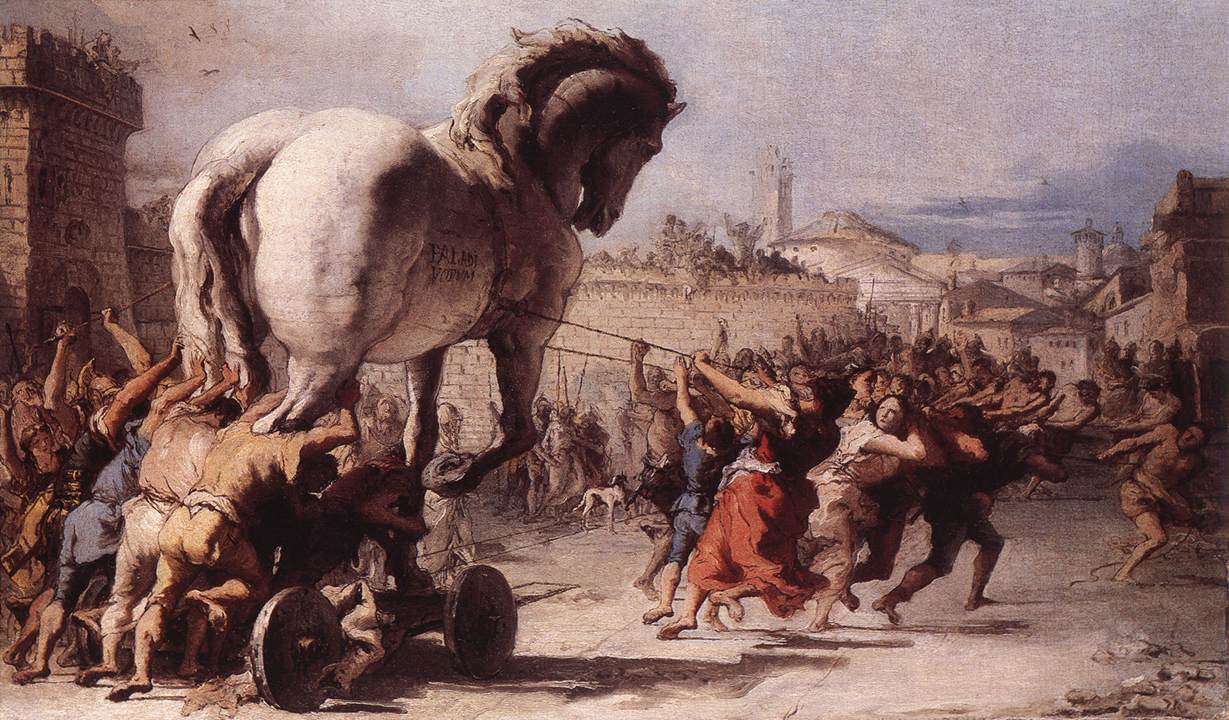
The Procession of the Trojan Horse in Troy: Giovanni Domenico Tiepolo, 1773, oil on canvas, 39 x 67 cm (National Gallery, London)

The narrow approach leading to the city gate of Troy, up which the Trojan horse needed to be hauled: photo by Brian Harrington Spier, 13 October 2007

The walls of Troy, erected nearly 5000 years ago: photo by Brian Harrington Spier, 13 October 2007

The narrow approach leading to the city gate of Troy, up which the Trojan horse needed to be hauled: photo by Brian Harrington Spier, 13 October 2007

The walls of Troy, erected nearly 5000 years ago: photo by Brian Harrington Spier, 13 October 2007
Euripides: Hecuba: The chorus sing the fall of Troy
-
Ilion, o my city,
- no longer will you be named among the cities
- never taken: lost in the Greek stormcloud,
- speared, sacked,
- your wreath of towers hacked
- from your head: sorry, fouled
- in the smoke and the ash strain,
- sad city
- I shall not walk in you again.
- Ruin came at midnight.
- We were in our room, sleepy-eyed, happy,
- tired, with the dancing over
- and the songs for our won war,
- everything over, my husband resting,
- his weapons hung on the wall,
- no Greeks to be seen any more,
- the armed fleet
- lost from our shores and gone.
- I was just doing my hair
- for the night, and the golden mirror
- showed me my own face there
- calm and still with delight,
- ready for love and sleep.
- And then the noise broke out in the streets
- and a cry never heard before:
- 'Greeks,
- Greeks, it is ours.' (They said.) 'Finish the war:
- break kill burn:
- end it, and we can go home.'
- Out of our bed, half naked
- like any Dorian girl
- I ran for the sanctuary
- of Artemis' shrine. No use, for I never made it.
- I saw my husband die.
- They have taken me over the sea.
- I look back at my city.
- Greek
- ships hasten for home, taking me
- with them, foredone
- with sorrow and pity.
- Curse Helen, curse
- Paris, the fatal pair
- whose love came too dear,
- who married to destroy
- my people my marriage and me,
- whose marriage burned Troy,
- May she never tread Greek ground.
- I hope she never makes it over the sea.
- I hope she is wrecked and drowned.
- She ruined me.
Euripides (c. 485-c. 406 B.C.): Hecuba, lines 905-951, translated by Richard Lattimore in The Stride of Time: New Poems and Translations, 1966
Bertolt Brecht: "The Trojans too, then" (Bei der Lektüre eines spätgriechischen Dichters / Reading a Late Greek Poet)

Helen's head, detail from a scene representing Menelaus' meeting with Helen. Attic red-figured krater, ca. 450 BC–440 BC. From Gnathia (now Egnazia, Italy): Menelaus Painter (eponymous vase); image by Jastrow, 2007 (Department of Greek, Etruscan and Roman Antiquities, Musée du Louvre)
At the time when their fall was certain --
On the ramparts the lament for the dead had begun --
The Trojans adjusted small pieces, small pieces
In the triple wooden gates, small pieces.
And began to take courage, to hope.
The Trojans too, then.

In den Tagen, als ihr Fall gewiß war --
Auf den Mauern begann schon die Totenklage --
Richteten die Troer Stückchen grade, Stückchen
In den dreifachen Holztoren, Stückchen
Und begannen Mut zu haben und gute Hoffnung.
Auch die Troer also.
Bertolt Brecht: Bei der Lektüre eines spätgriechischen Dichters / Reading a Late Greek Poet from Buckower Elegien / Buckow Elegies, July/August 1953: English version by Michael Hamburger in Bertolt Brecht: Poems 1913-1956, ed. John Willett and Ralph Manheim with the co-operation of Erich Fried, 1976
Auf den Mauern begann schon die Totenklage --
Richteten die Troer Stückchen grade, Stückchen
In den dreifachen Holztoren, Stückchen
Und begannen Mut zu haben und gute Hoffnung.
Auch die Troer also.
Bertolt Brecht: Bei der Lektüre eines spätgriechischen Dichters / Reading a Late Greek Poet from Buckower Elegien / Buckow Elegies, July/August 1953: English version by Michael Hamburger in Bertolt Brecht: Poems 1913-1956, ed. John Willett and Ralph Manheim with the co-operation of Erich Fried, 1976
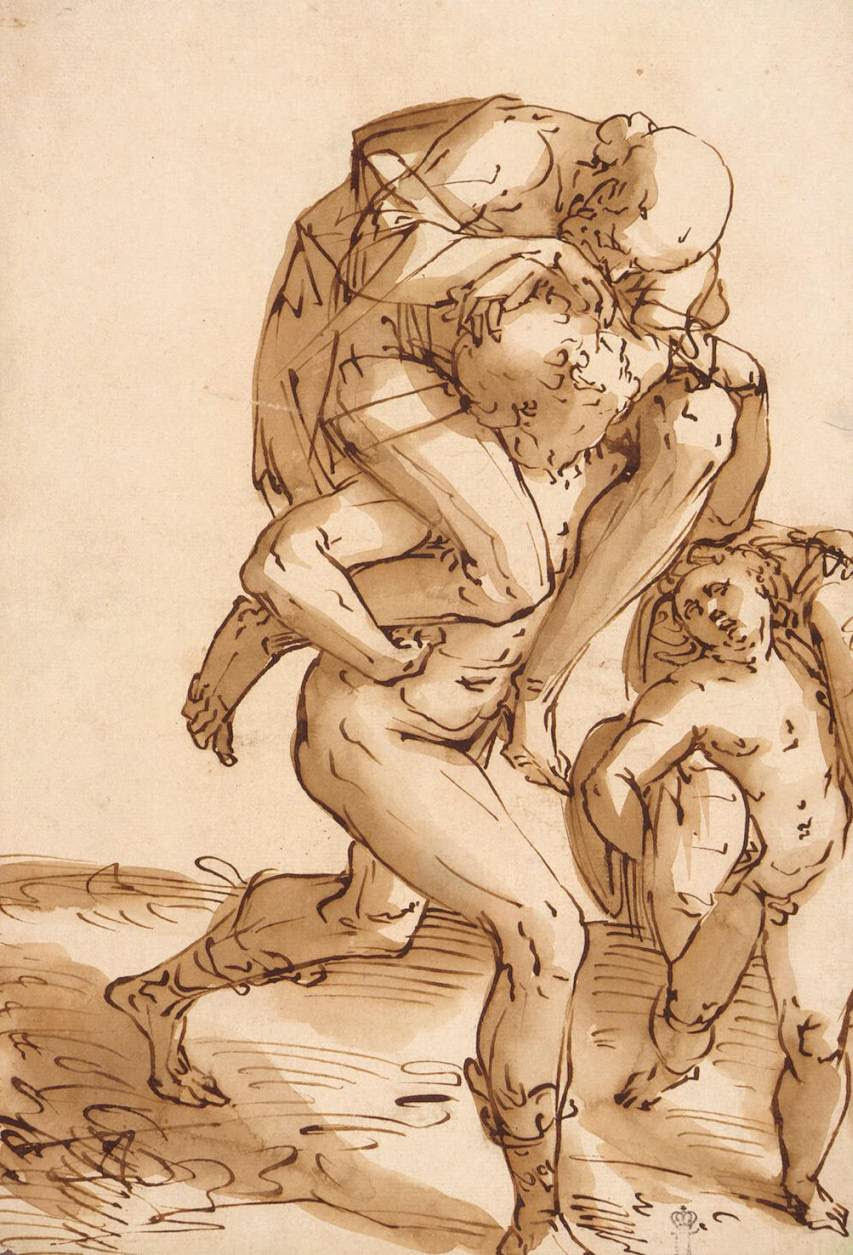
Flight of Aeneas, Anchises and Ascanius from Troy: Luca Cambiaso, 1555-60, pen and brush and brown wash, 404 x 281 mm (The Hermitage, St. Petersburg)
C. P. Cavafy: Trojans
Our efforts are those of men prone to disaster;
our efforts are like those of the Trojans.
We just begin to get somewhere,
gain a little confidence,
grow almost bold and hopeful,
when something always comes up to stop us:
Achilles leaps out of the trench in front of us
and terrifies us with his violent shouting.
Our efforts are like those of the Trojans.
We think we’ll change our luck
by being resolute and daring,
so we move outside ready to fight.
But when the great crisis comes,
our boldness and resolution vanish;
our spirit falters, paralyzed,
and we scurry around the walls
trying to save ourselves by running away.
Yet we’re sure to fail. Up there,
high on the walls, the dirge has already begun.
They’re mourning the memory, the aura of our days.
Priam and Hecuba mourn for us bitterly.
C. P. Cavafy: Trojans (1905), from Collected Poems, edited by George Savidis, translated by Edmund Keeley and Philip Sherrard, 1975
Rana and her mother...she can't see anything just she could feel in her mother mercy.
#GAZA #Palestine: image via Ahmad Gaza @ahmadsaman7, 19 February 2015


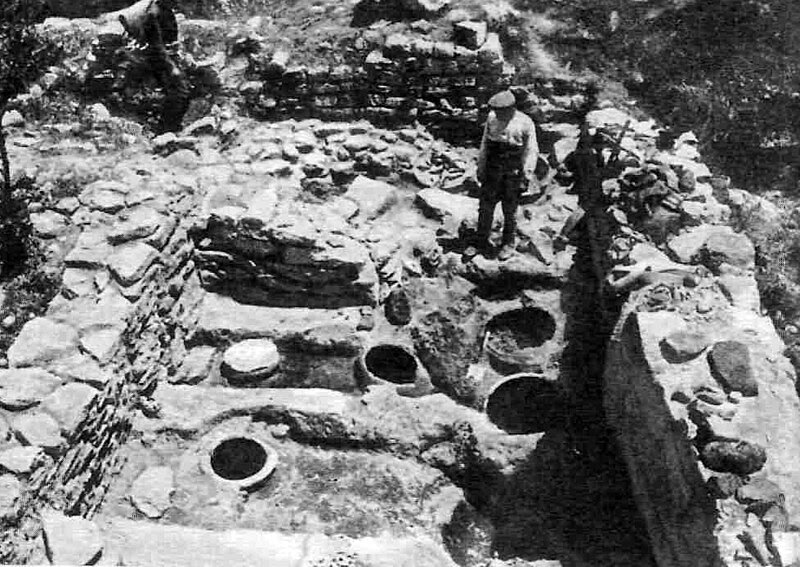



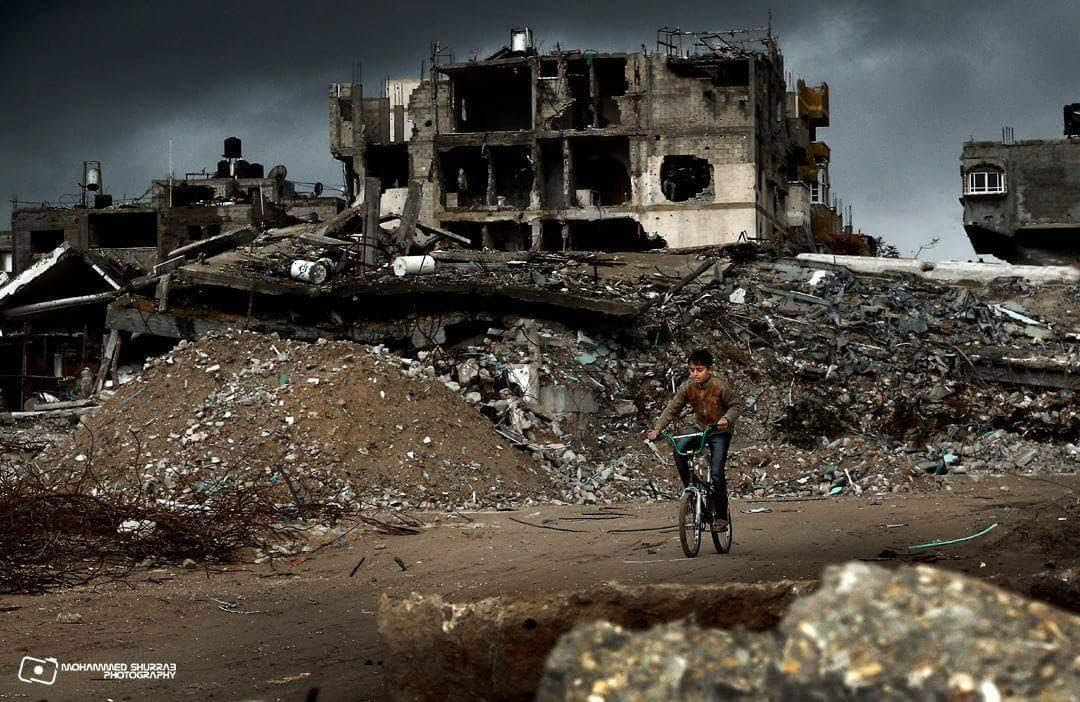
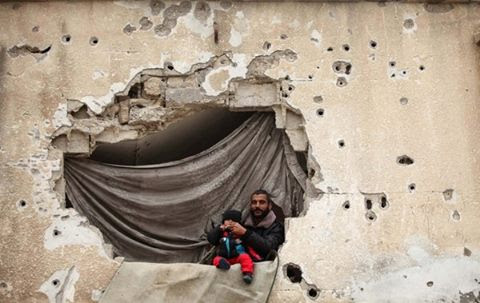





3 comments:
What a remarkable interview - tense, intimate, combative, sparking with love and anger. A tremendously deep well you could draw from for years. And the way you've developed the Troy element only drives the shaft deeper, Tom. Thanks - this one will stay with me.
An extraordinary post.
That final image is heart-breaking... and yet a testament to the power of love unbroken, even as everything else is destroyed.
Thank you, Barry and Maureen.
The movement of thought, gently but firmly, and with unwavering resolution, in Darwish's polite, intent directing of this interview, moved me greatly.
The proposition that a poet must at all times work against the grain, as an inconvenient thorn in the side of Power, in fealty not to flag or country or faith or career, in service of the eternal struggle of poetry against domination in all its forms, most of all in the form of state power, is not one that gains wide subscription currently -- but Darwish's adherence to its terms is no small part in his lasting meaning, as an image of what a world poet could be.
Post a Comment